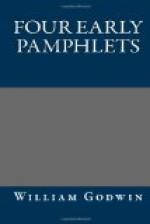Lastly, for the QUARREL PERSONAL—It may be infinitely diversified.—I have other instances in my eye,—but I will mention only one.—Minds capable of the widest comprehension, when held back from their proper field, may turn to lesser employments, that fools may wonder at, and canting hypocrites accuse—A CATO might indulge to the pleasures of the bottle, and a CAESAR might play—Unfortunately you may have a CAESAR to oppose you—Let him discuss a matter of finance—that subject is always open—there you have an easy answer. In the former case you parried, here you thrust.—You must admire at his presumption—tell him roundly he is not capable of the subject—and dam his strongest reasons by calling them the reasons of a gambler.
KASTRIL.
Admirable!—Oh doctor!—I
will thank you for ever.—I will do
any thing for you!
[Face enters at the corner
of the stage, winks at Subtle, and
exit.]
SUBTLE.
“Come, Sir, the captain will come to us presently—I will have you to my chamber of demonstrations, and show my instrument for quarrelling, with all the points of the compass marked upon it. It will make you able to quarrel to a straw’s breadth at moonlight.
Exeunt.”
ARTICLE IX.
REFLEXIONS UPON THE PRESENT STATE OF THE UNITED STATES OF AMERICA. BY THOMAS PAINE, M.A. &c. 8vo.
The revolution of America is the most important event of the present century. Other revolutions have originated in immediate personal feeling, have pointed only at a few partial grievances, or, preserving the tyranny entire, have consisted only in a struggle about the persons in whom it should be vested. This only has commenced in an accurate and extensive view of things, and at a time when the subject of government was perfectly understood. The persons, who have had the principal share in conducting it, exhibit a combination of wisdom, spirit and genius, that can never be sufficiently admired.
In this honourable list, the name of Mr. Paine by no means occupies the lowest place. He is the best of all their political writers. His celebrated pamphlet of Common Sense appeared at a most critical period, and certainly did important service to the cause of independency. His style is exactly that of popular oratory. Rough, negligent and perspicuous, it presents us occasionally with the boldest figures and the most animated language. It is perfectly intelligible to persons of all ranks, and it speaks with energy to the sturdy feelings of uncultivated nature. The sentiments of the writer are stern, and we think even rancorous to the mother country. They may be the sentiments of a patriot, they are not certainly those of a philosopher.
Mr. Paine has thought fit to offer some advice to his countrymen in the present juncture, in which, according to some, they stand in considerable need of it. The performance is not unworthy of the other productions of this author. It has the same virtues and the same defects. We have extracted the following passage, as one of the most singular and interesting.




